
‘Sole Searching’ is a series that highlights Black women in the sneaker community, how their passion for footwear began, their thoughts on Black women in sneaker culture, and how they’re leaving their legacy in the sneaker world.
I met Essie Golden on ZOOM for the first time and she had a true red matte lip, dark brown faux locs, large blocky blue light glasses, and a joyous personality to match. I had been following the beauty blogger, influencer, designer, and model for quite some time on social media because of her epic style, swag, and sneaker collection but I wasn’t prepared for the amount of natural radiance and beautiful spirit that she would bring to our conversation.
We formed an instant connection when we were talking about my hometown of Brooklyn, New York, and how the city gives everyone equal chance and opportunity to express themselves freely through beauty, style, and negating the stereotypical fashion trends. “Moving here, it really changed my outlook on what is possible in style and because nobody was out with pitchforks where it’s like, ‘Hey, plus size women can’t wear this, they can’t do this, or they can’t do that,’ it just changed me,” the HBCU alumna praised of Brooklyn’s environment.
During her time in BK, Golden told me that she was able to grow and find her stride when it came to identifying her personal style – and she expressed nothing less than complete gratitude for the city for pushing her boundaries. While, at first, she was a bit intimidated by the IDGAF-ness of New Yorkers, Golden gradually began to take more fashion risks which resulted in receiving praise and admiration from the beautiful Black women on the street who inspired her.
“I truly enjoy being a feminine woman wearing sneakers and all other kinds of stuff,” Golden told me. “I do see a lot more of the sweats and the different things but I think what a sneaker wearer, a sneaker style, and a sneakerhead is, is obviously changing a little bit – not that’s a bad thing.”
In the second installation of ‘Sole Searching,’ Golden catches up with ESSENCE about body positivity being more than a buzzword in the fashion industry, the inspiration behind her “Thick Laces” movement, and what it means to be the embodiment of golden confidence.
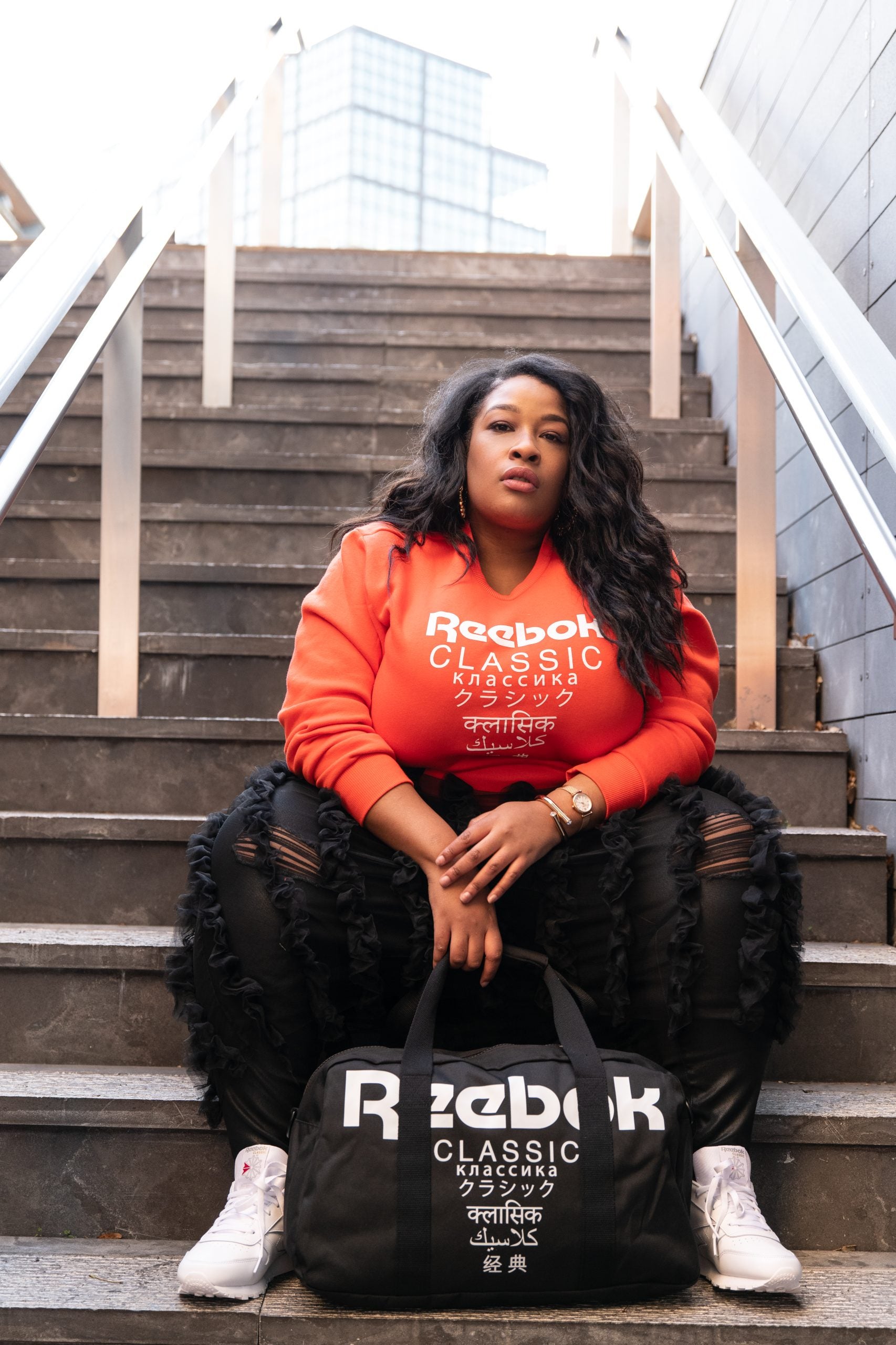
On when she first fell in love with sneakers:
“I grew up in the foster care system. When I got adopted by my absolute last family and when I first got to their house – it was a beautiful Black family who lived in a great area – they, as a welcome home gift, handed me a classic pair of white Reebok. It was the first name-brand anything that I had ever received in my entire life; all the stuff that I mostly got was hand-me-downs. To see that and to feel that and I felt like, ‘I’m special, I belong. I like how this looks,’ and the shoe went with everything. I was like, ‘Oh, I want more of this, I belong.’ This shoe, something so simple as a piece of clothing or a shoe can make you feel like you belong, like you matter. Receiving that really changed my life. I’ve always liked sneakers and didn’t always have the money, but I will say what picked my interest was the Sacai Waffles.
“Oh my God, they’re so beautiful. I love when your outfit can speak for you. I love when someone’s asking me, ‘Where did you get that? Where did that happen?’ You see so much of that in New York because everyone has unique styles. Seeing that Sacai Waffle, it was such a different shoe. The double checks, the different colors and it was a shoe that stood out. I was like, ‘I want you to ask me where I got that from. I need that shoe.’ That sparked interest for me. I may not always speak how I feel but being able to express myself through fashion and clothes has always been my go-to. It’s always been a great way to have a conversation starter.
“I did not get a chance to get them on the SNKRS App so that also introduced me to the many L’s that I have taken in this industry. I overpaid, obviously, like everybody else on StockX. Putting that on my feet, I was like, ‘Oh wow, there’s so much I could do with this. I feel so cool. I feel I’m a part of something.’ From then on, I just started to buy more sneakers than I need and so I’m grateful. I love what’s happening in this space, but that was the one sneaker that came out that sparked my interest like, ‘Oh, this is dope. I need more of this.'”
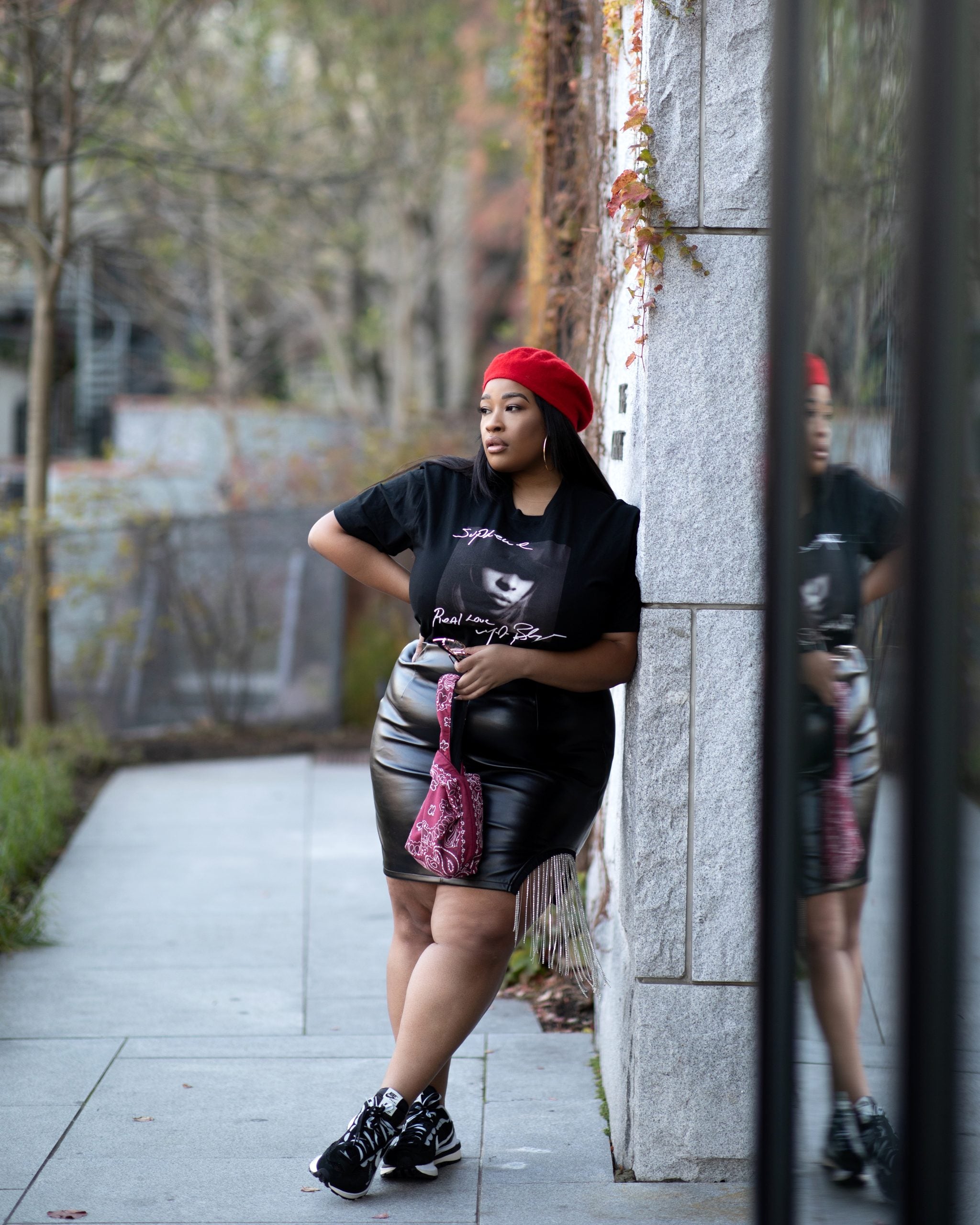
On building the “Thick Laces” community and advocating for size inclusivity in the sneaker world:
“Like everyone else during the pandemic, people picked up all different types of habits. Some people got banana bread or all these different things. That wasn’t my thing but I was following so many dope Black women within the sneaker space. I was looking at their feet like, ‘Yo, I need that. I like how they styled that. I like how they did that.’ I was buying these sneakers and of course, being an influencer in the game for so long, you’re using hashtags, you’re tagging these brands and pages, which is super terrible. A lot of the main pages of the streetwear and sneaker pages, they’re not featuring many Black women and they’re definitely not featuring plus-size women. Then I started looking at the pages that were specifically for Black women and they weren’t featuring any plus-size women.
“Years ago, I started Golden Confidence for the same reason of not having representation in any space in fashion. I reached out to my friend, Katie, who is the co-founder of Thick Laces with me. She is the definition of a sneakerhead, she used to be a sneaker plug, she knows more than I do and so I was like, ‘Girl, we should come together and we should start Thick Laces as a way to showcase women who look like us, who want to see themselves featured.’ I know what it’s like using hashtags, tagging brands, and seeing all these comments in your own feed but not getting the recognition that you’re hoping to see from other brands on their pages. You just want to belong.
“We started Thick Laces as a way to do that and see the changes that we have already seen from not only just sneaker pages but from brands. We’ve had conversations with brands like Reebok and other brands saying, ‘We didn’t necessarily know that plus size women bought sneakers. We didn’t know that. Maybe we should be more inclusive,’ which is insane to me because everybody can wear a sneaker. It has nothing to do with what size clothes you wear. You’re literally selling a shoe.
“So many brands don’t understand that being inclusive matters when the average woman is a 16, 18 – it’s a multi-billion dollar industry. Nobody spends more than we do and we are the most loyal customer ever because we haven’t had any options. When we see something that we like or we see brands really promoting it and really putting their dollars behind us, we’re buying it. We’re buying multiples and we’re telling our friends like, ‘Yo, you should look at this.’ It’s been great to start the page and to see the changes. I don’t always feel people didn’t include us on purpose but I feel if every single one of your friends looks like you and you only see your circle, you’re going to miss out on so much unless somebody tells you something. Now that we’ve had the conversation, now that we’ve shown you, now that we’ve told you, I’ve been a lot happier seeing the changes that I’ve seen online specifically.”
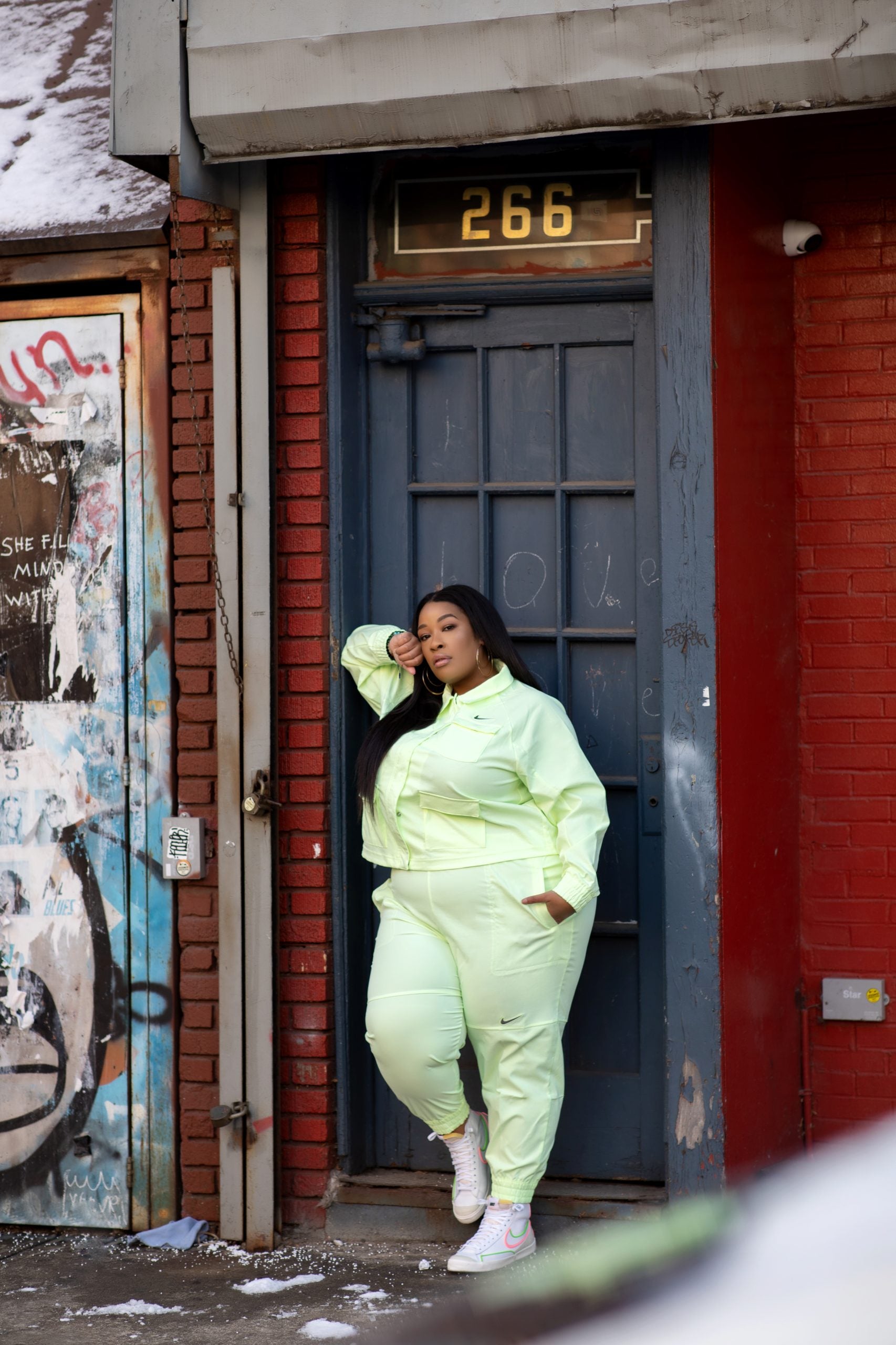
On body positivity and size representation in the sneaker community as it currently stands:
“I feel like everywhere else it’s happening, but the sneaker world is super duper slow and I’m not quite sure why it’s so slow. I think the name of the game now, instead of it being exclusive, it’s being more inclusive. I like that a lot more brands are showcasing straight size and plus sizes together because that’s the world that I see. I feel like that’s the world that everybody else sees. When I go outside in New York City, I don’t see everybody separate. Because most of these brands do go up to a 4XL, like the big brands like Nike and Reebok, they’re able to showcase larger sizes. That is something that we should be seeing more advertised because that’s what people want to see.
“Case in point, look at brands like Abercrombie & Fitch, American Eagle, and Aerie which was notoriously like, ‘We don’t feature anyone above a size two or a size four,’ and even the explosion that they’ve seen being able to showcase larger sizes. Heck, even with Victoria’s Secret, they’ve had to change what they’ve done because of everything that’s happened with Savage x FENTY. I think if you look at a brand like that and you see how straight out the gate, we’re showcasing people of all shapes, sizes, colors, ethnicities, everything all out in point. Everyone’s beautiful in the way that they look, there’s no one way to be beautiful and the success that they’ve had, how they’ve changed other brands and how they showcase themselves. I think if more sneaker brands looked at that, they would be a lot more successful.”
On the term “body positivity” being misused and overused as a buzzword in fashion campaigns:
“Yeah, it is and it does make me a little bit sad, I will say that. Funny enough, there’s a hashtag called #fightforinclusivity, where there are women who are hoping to see sizes above a 3X. For instance, I have an Amazon drop collection that’s coming out and when they first approached me, they only did 3XL. Unfortunately, because I am a 3XL, a 2X on top, 2X on the bottom, I know there are so many other women who want access to clothes and these bigger brands who can afford to expand their sizing and do things like that, they should be more inclusive and having larger sizes.
“I originally said, ‘No,’ which was hard for me because that’s what I want. When your dream and your goals are right there in front of you and someone says, ‘Hey, we’ll give it to you but it’s not perfect,’ saying no was hard. They came back a couple months later and said, ‘Hey, we heard what you said, we’ve already been working on it,’ and now we have up to 5XL which is something that’s so important to me because I know what it’s like being in this industry for as long as I have. I’ve seen the changes from not having any sizes, for begging for brands to do stuff for us to us now having so many options. I do feel though, when you look up body positivity often, as always, Black women are left out. When you look up body positivity and its original meaning, it was started by queer Black women and that often happens with so many of us, and anything that Black people start.
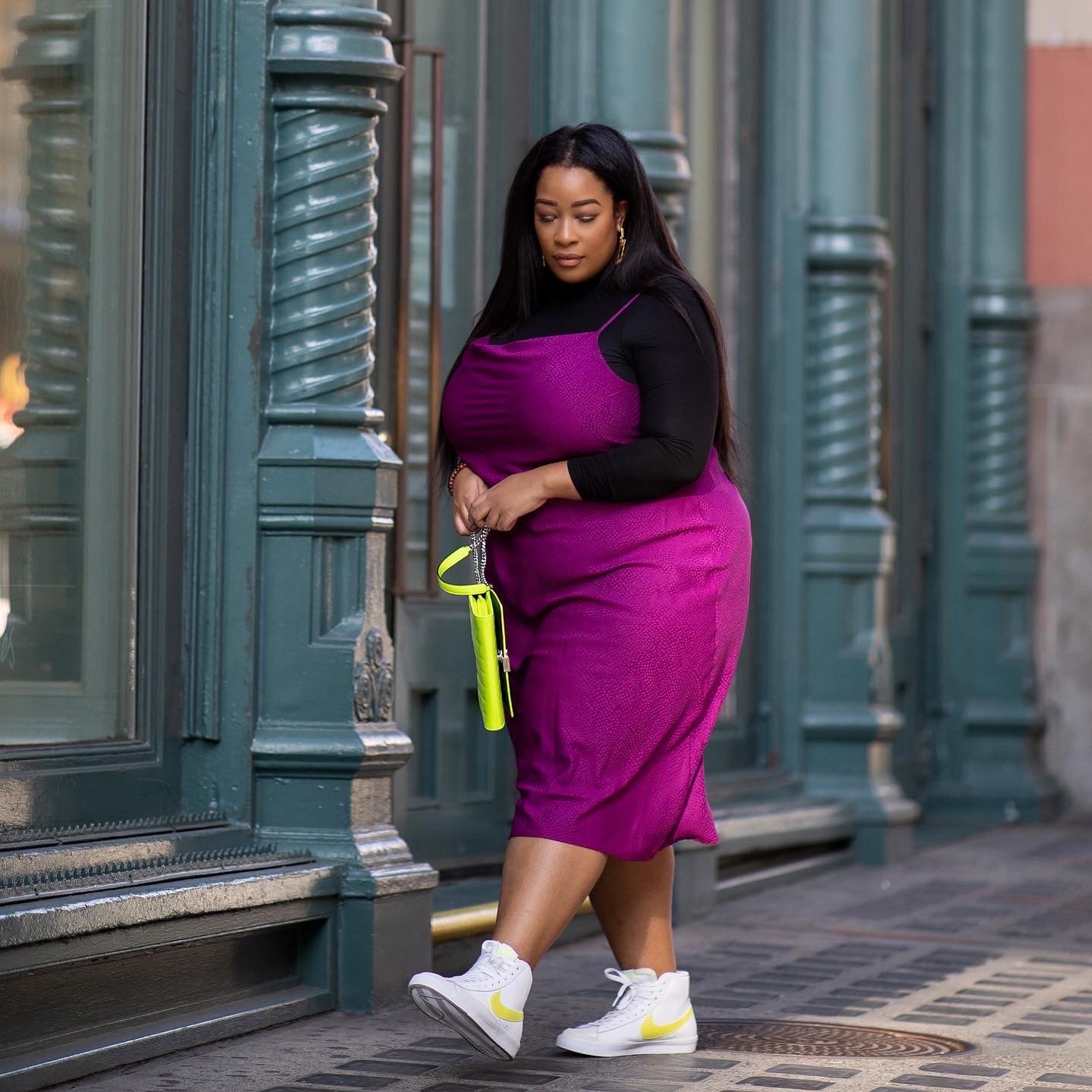
“We are the spearheads, we are the inspiration. We do the work and when it’s finally time to really get something from this, we are often left out. A lot of Black women, a lot of plus-size women who started this with me who were above a size 18, they no longer use body positivity, which makes me sad. I’m still going to use it. They use fat positivity and other things however, I’m still going to use it. It’s what my platform is built on. I hope that I’m continuing to show women that body positivity is still safe for them to use and that they have every right to use it.
“I do want to continue to encourage brands that are using that term to make sure that you’re including all ethnicities, all different shapes and if you truly aren’t going past a 3XL, you really should stop saying ‘inclusive’. I feel like sometimes people use it as a buzzword like, ‘Look at us. Look at what we’re doing. We’re great,’ but then I can’t go in your store, I can’t shop, and I can’t find my size. After a while, it really is offensive for brands to use it. In the past 10 years, a lot has changed. I feel like we’ll continue with people using our voices and making brands what they do.”
On Orlando, FL sneaker culture in comparison to Brooklyn, NY:
“When I think of Orlando specifically, I don’t think of style. We wear flip-flops 365, so that’s what I think of when I think of style. I don’t necessarily think of sneakers. However, I do see it as a community that is growing. You all forgive me – don’t kill me. New York was a game-changer. When I came here, I discovered women’s streetwear brands like Married To The Mob, Dimepiece LA, and Hells’ Bells. During that time, I was going to Brooklyn loft parties of weird, unique artist people and everyone was wearing sneakers or different streetwear brands. I got a chance to discover more. New Yorkers are very much true to their very unique style.
On her go-to sneakers and some of her favorite kicks:
“My favorite sneaker right now is the New Balance Aime Leon Dore, the 650s. I love a vintagey, old-school sneaker. Obviously a classic white Reebok. People sleep on Converses. They were playing basketball in them hard-ass shoes, but I love Converses. Obviously, I love the [Nike] Air MAX, the Concept one that just came out, the heavy ones – so beautiful. My grail shoe that I haven’t gotten a chance to get, and strongly considering selling an organ for, is the Melody Ehsani Fearless One Jordans. I tried so hard to get it that day. I know that the site was glitching, the bots were on it and I keep praying. I guess that’s also the excitement, right?
“We love going on Twitter and on my Instagram stories and sharing another L and my followers are like, ‘Dang again.’ Then when I win one they’re like, ‘Girl, we was praying for you. We had fingers crossed for you. I guess that is the excitement. Hopefully, one day I will score that shoe but the uniqueness, the watch part, the different colors, and how she put it together are just so beautiful. Collecting sneakers has pretty much been collecting art. I may not be able to get a Picasso but I can get a beautiful ass sneaker and look at it, stare at it and maybe wear it, maybe not, but to be able to have that in my possession is just everything to me.”
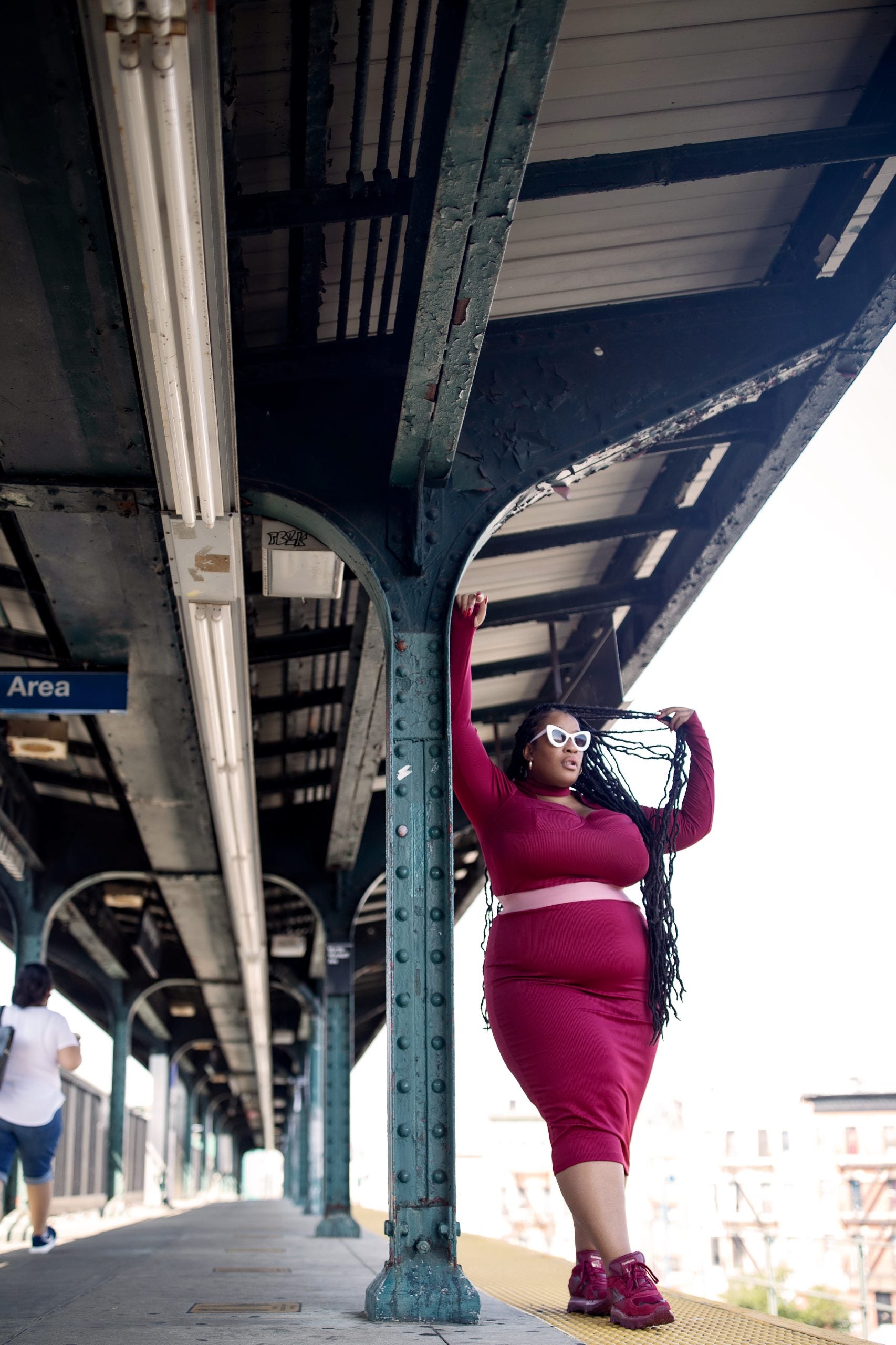
On the legacy she wishes to leave in the sneaker community:
“I hope that I have shown specifically plus size women that there’s a way to find their own style. That they’re beautiful, no matter what they wear. To have the courage to try different styles, different things. I think for so long, if people have only told you to cover this, cover that, wear a heel, wear this, wear that, that stays ingrained in you and only until you find other people in other spaces where you’re like, ‘Oh, there’s another way to be. There’s another way to do.’ I hope that my legacy is [that] I made women feel good, that I made brands change their perspective on who a plus size woman is, what she wants to wear, and what she wants to do, and that I made them feel good.
I hope that they looked at me and be like, ‘Yo, she had that on, I could wear it too and I feel good because you made me feel good because of what you had on and what you said and you made me feel beautiful.’ I really hope that every woman that follows me feels like, ‘Yo, she’s killing it, she’s doing it. I could do it too and I feel good. I’m beautiful.’ Fingers crossed, that’s what I do for people.
On style advice she’d give her younger self:
“One, stop wearing flip-flops everywhere, including in the club. Take the flip-flops off. Outside of that, young Essie wasn’t comfortable in her body. I went to a predominantly white school and middle school, elementary, and all of high school. I was always the biggest kid and I played sports. I did all these different things. My experience was pretty good. However, I didn’t date, I didn’t do much. It wasn’t until I went to an HBCU, Bethune-Cookman University, and the way that it changed for me, finding my own beauty because men found me beautiful, and in my entire life I didn’t feel that way. Growing up, I felt like, ‘Oh my God, I’m going to be alone for the rest of my life. My style is terrible. There’s not going to be any clothes. I’m the biggest thing ever.’ I would just tell myself, ‘Girl, it gets better. The fashion gets better, the style gets better, the confidence. You are beautiful and do not care so much about what other people feel and think about you. It gets better. Life gets better, things get better, the job gets better, career gets better. Money gets better, girl.’
“A girl in middle school and high school can now go into an Old Navy or an Abercrombie & Fitch with her friends. Me, I was designated to the handbag section and accessory section because there’s nothing in the store that’s going to fit me. Now with the work that the body positivity community has done, a girl can shop with her friends and in those moments, all you want more than anything is to fit in. ‘I still want to stand out but I want to fit in with everybody. I want to be able to try on clothes with you. I want to be able to do this and do that. I don’t want to feel so left out because I can’t fit anything.’ With the work that’s happened in the past 10 years from so many Black women specifically, plus size women specifically, to advocate for everyone, things have changed. I’m grateful that so many beautiful women get to walk into a store and be normal and have a normal life. Fashion is the last thing that you have to worry about; what you look like is the last thing they have to worry about. You get to be like everybody else. That’s so dope.”




